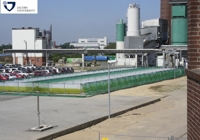
Jacobs University Bremen, Campus Ring 8, Research III, room 107, 28759 Bremen, Germany
e-mail: l.thomsen@jacobs-university.de
URL: http://ses.jacobs-university.de/ses/research/oceanlab/people/lthomsen

 |
Laurenz Thomsen
Jacobs University Bremen, Campus Ring 8, Research III, room 107, 28759 Bremen, Germany e-mail: l.thomsen@jacobs-university.de URL: http://ses.jacobs-university.de/ses/research/oceanlab/people/lthomsen |
 |
The advantage of marine microalgae systems lies in its potential for high productivity, giving them a small footprint compared to other biological systems, the ability to use otherwise unsuitable water and land resources, the integration with waste treatment and the enhanced production per area, not readily obtained from other biomass sources. Research at Jacobs University Bremen together with its spin-off company Phytolutions at several powerplants in Europe resulted in the development of a new closed endless foil bioreactor. For large algae farms (several hectares) the installation costs can be reduced to 10 – 15 €/m2 with expected production rates of up to 120 t/ha. This also includes mixotrophy using additional carbons sources from wastewater. No greenhouse is needed for the algae farm, temperature control and downstreaming of biomass are achieved through waste-heat from the powerplant. Fertilizers are recycled from wastewaters. Bioethanol, biodiesel, BtL and methane have been produced so far. Still, the production costs are too high but the microalgae can be mixed with marine algae from the ocean to achieve a distinct heat-value. The harvest from the ocean is carried out in an ecological suitable matter and remote sensing and modelling of surface currents is used to find the suitable harvesting sites.